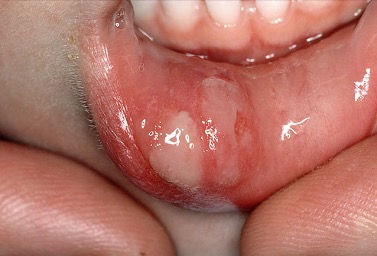You feel a small sore area on the inside of your lip, under your tongue or gums. The sore wasn’t there yesterday. What you have is a canker sore or in clinical terms, an aphthous ulcer.
In this issue, we will discuss the dreaded mouth ulcer; called the Canker Sore.
Mouth sores are very common and painful lesions. The most common mouth sores are called aphthous ulcers, commonly referred to as canker sores. They are characterized by small, shallow lesions that develop on the soft moveable tissues in your mouth. Unlike cold sores, canker sores don’t occur on the surface of your lips and are non-contagious. They can be painful and can make eating and talking difficult.
Most canker sores go away on their own in a week or two. They are usually less than one half inch in diameter, oval and have a red border with a whitish or yellowish center. You will sometimes feel a tingling sensation in the area for a couple of days before they actually show up.
A canker sore may be confused with a cold sore. Cold sores are from viruses and are usually found on the dry portion of the lip or on the palate or attached portion of the gums. Cold sores are from the Herpes virus. They are contagious and respond to anti-viral medications. Canker sores, on the other hand occur on the loose portion of the inner lips, below the gum line and under the tongue. They are neither viral or contagious.
Causes of Canker Sores:
Canker sores usually appear for no apparent reason. However, some factors seem to predispose persons to canker sores. They are sometimes caused by sharp or rough tooth edges caused by fractured teeth or broken fillings. Also, sensitivities to foods: like chocolate, coffee, strawberries, eggs, nuts, cheese, as well as highly acidic foods are some of the food culprits. People with HIV/AIDS often have large canker sores that persists for weeks.
Canker sores can be related to allergies as well as a diet lacking vitamin B12, zinc, folate and iron. Also, canker sores can be caused by Helicobacter pylori and inflammatory bowel diseases. If these sores just start appearing, look at the changes that you have made in your medication or diets.
Prevention tips:
Canker sores often recur, but you may be able to reduce their frequency by following these tips:
- Watch what you eat. Try to avoid foods that seem to irritate your mouth. These may include nuts, chips, pretzels, certain spices, salty foods and acidic fruits. Avoid any foods to which you’re sensitive or allergic.
- Eat healthy foods. To help prevent nutritional deficiencies, eat plenty of fruits, vegetables and whole grains.
- Practice good oral hygiene. Regular brushing after meals and flossing once a day can keep your mouth clean and free of foods that might trigger a sore. Use a soft brush to help prevent irritation to delicate mouth tissues and avoid toothpastes and mouth rinses that contain sodium lauryl sulfate.
- Manage your stress. If your canker sores seem to be related to stress, learn and use stress-reduction techniques.
Treatment tips:
While canker sores are a nuisance, they are not dangerous. The best treatment sometimes is no treatment. Canker sores usually go away by themselves. Basic treatment consists of relieving the pain with the same measures used for other mouth sores. Dentists often recommend chlorhexidine mouth rinses. If there are many canker sores, physicians sometimes recommend a corticosteroid such as dexamethasone applied as a rinse.
Mouth ulcers are very painful and common place. The key is to observe your oral tissues, take consistent care of your dental care and manage stressors in your life. Dentists and physicians are prepared to assist if and when the need arise.
Dr. Kendal V. O. Major is Founder and CEO of Center for Specialized Dentistry which is a comprehensive family dental practice operating in Nassau and Freeport. He is the first Bahamian Specialist in gum diseases and dental implants since 1989. He also is a certified Fast braces provider. His practice is located at 89 Collins Avenue, Nassau at (242)325-5165 or [email protected].

Aphthous ulcers located under tongue

Large ulcer on the inside of the lower lip


